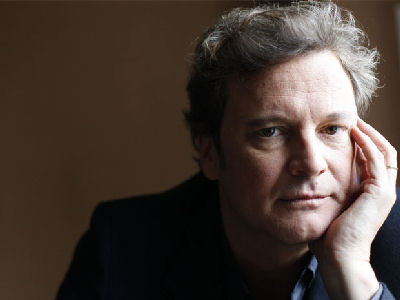The film's the thing for
Colin Firth to catch the essence of a King
|

|
One of the main
reasons Colin Firth became an actor is so he'd never have to dress up
in formal wear or lead the stiff life of an Englishman. Now, he's
playing King George VI in The King's Speech.
Every year, the Toronto International Film Festival ushers in newly
minted celebrity royalty—sometimes literally. Last year, Emily Blunt
was feted for her performance in the closing-night film The Young
Victoria. This year the monarch of the screen is Victoria’s
great-grandson, George VI, as played by Colin Firth in The King’s
Speech. The film gets a gala premiere at Roy Thomson Hall Friday night.
Firth, who turns 50 on Friday, seems to have been born to play the shy,
repressed and stammer-prone future King. His quintessential role
remains that of Mr. Darcy in the 1995 BBC miniseries Pride and
Prejudice; a part he reprised in two Bridget Jones movies. Last year he
was Oscar-nominated for A Single Man, playing a closeted gay professor
dealing with the death of his lover in 1962.
But Firth is quick to quash any stories of personal
stiff-upper-lippedness. “I think the reserve that I project is more
something of a stock and trade for films than it is in my own life,” he
says (somewhat reservedly, it must be said).
As a youth, “I was far more interested in growing my hair, piercing my
ears and learning to play the guitar … than I was in wearing a suit and
a tie. And the great paradox of my life is that one of the reasons I
became an actor is so I’d never have to do that, putting on ties and
leading the life of a stiff Englishman. And look what happened.”
In fact, a youthful turn in a rock band helped inform his role in The
King’s Speech, after his enthusiastic vocals left him with a weak
larynx. “It damages your vocal cords if you’re not actually Robert
Plant,” he says dryly.
Then a bout of laryngitis in his twenties rendered him unable to speak
beyond a whisper for many months. “I would avoid bars and restaurants
because I couldn’t project above the level of the room,” he says. “I
started to strategize my way around my failure to communicate. I said
things differently than the way I would choose to say them.
“And I remember thinking: ‘I don’t have my personality. If I can’t say
it this way, who am I then?’ ”
In the film, George’s stammer is the subject of much royal
hand-wringing, but it becomes a crisis when his elder brother (a
foppish Guy Pearce) abdicates to marry American divorcee Wallis
Simpson. As next in line to the throne, George is expected to lead his
people through the new medium of radio, which abhors a vacuum.
Enter Lionel Logue, an Australian speech therapist hired to cure
George—or “Bertie,” as he cheekily insists on calling him—of his
impediment. Logue is played by Geoffrey Rush, who’s thrilled to bring
an Australian character to the screen but jokes that the plot might be
a hard sell. “Two middle-aged men become friends,” he intones. “Don’t
splash that across the poster.”
In fact, the film is peppered with great comedic dialogue, some of it
actually written by George VI. For instance, when the King pulls off a
near-perfect radio address, Logue gently notes that he still stumbled a
few times. “I had to throw in a few,” Bertie replies, “so they’d know
it was me.”
Director Tom Hooper (The Damned United, TV’s John Adams miniseries)
says that, about nine weeks before filming began on The King’s Speech,
he learned that Logue’s grandson was living in London, just a 10-minute
drive away. A visit gave him access to Logue’s private diaries, in
which he wrote about treating the King. “We had this extraordinary
treasure trove,” Hooper says.
The director is
diplomatic about the possibility that Firth could score his second
Oscar nomination, and that the film itself might grab a best-picture
nod. “Whatever happens I just hope it will allow more people to see the
film,” he says.
Firth is even more circumspect—at first. “What it does is create a
question that’s almost impossible to answer,” he says. “It’s very
sudden.”
Then he decides to open up a little. “I would love everything to get
thrown at it. Of course I would. I’ve had a lot of years of working on
stuff where the only thing people throw at it is rotten tomatoes. A few
baubles would do very nicely, thank you.”
Spoken like a king.
|
